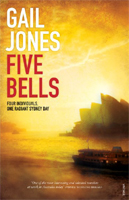 |
Five Bells Gail Jones 2011 Random House |
[This novel was shortlisted for the 2011 Victorian Premier's Literary Award and the 2012 Festival award for Literature (SA), and has been longlisted for the 2012 Australian Literary Society Gold medal.]
From the publisher's page:
On a radiant day in Sydney, four people converge on Circular Quay, site of the iconic Opera House and the Sydney Harbour Bridge. Each of the four is haunted by memories of the past: Ellie is preoccupied by her experiences as a girl, James by a tragedy for which he feels responsible, Catherine by the loss of her beloved brother in Dublin and Pei Xing by her imprisonment during China's Cultural Revolution. Told over the course of a single Saturday, Five Bells describes vividly four lives which chime and resonate. By night-time, when Sydney is drenched in a rainstorm, each life has been transformed.
Reviews
Stella Clarke in "The Australian": "This new novel establishes Gail Jones as one of Australia's finest authors. Beyond storytelling, her art consists in a remarkable ability to release life from numbing habit. Her prose is poetic and infinitely pleasurable, imbued with a rare capacity to awaken. She reconciles what is richly human with mundane and alienating aspects of our sophisticated world...Five Bells is a brilliant work, both explicitly Australian and insistently cosmopolitan. Though vivid images of harbour and opera house pervade the narrative, triggering exquisitely rendered perceptions, Jones's Sydney is a global hub and her literary allegiance exceeds national boundaries. Jones is unafraid of making bold statements with her writing. Five Bells pays beautiful homage to modernism and self-consciously translates its enduring gifts into a contemporary Australian context. As with James Joyce's Ulysses and Virginia Woolf's Mrs Dalloway, Five Bells takes the space of only one day. As it draws to a close, the elegiac tones of Joyce's Portrait of the Artist as a Young Man are soulfully transposed on to the darkening harbour scene. The book is most emphatically anchored, however, in the agonised, brooding lyricism of one of Australia's best-known poems."
Jack Nicholls in "Meanjin": "Jones' novel is inspired by the 1939 Kenneth Slessor poem of the same name, and shares its elegiac tone and Sydney Harbor setting. The story follows four diverse characters through a sunny day in the city. There is Ellie, the optimist; James, the depressive; Catherine, the practical Irish tourist, and Pei Xing, serene survivor of China's Cultural Revolution. The fifth 'bell', a child, makes a fleeting appearance at the end...Each of the protagonists is grappling with loss - dead children, dead parents, dead siblings. At its heart, Five Bells is about how different people respond to grief. Some people accept it and move on, some people flee it, and some people are frozen by it...A story like this stands and falls on its characterisation, and for me this was where Five Bells stumbled. Particularly so with James; who came across as more fantasy than real man. An emotionally sensitive intellectual, with the dishevelled charm of an 'aging rock star', his pronouncements on sex are romantic to say the least: 'women didn't realise this: that the noise a man made when he came was of gratitude, simply to have been admitted'."
Peter Pierce in "The Sydney Morning Herald": "Jones does not shirk coincidence, any more than Dickens did, believing that our fates are inextricably if inexplicably entwined. This is how Jones eloquently states her view of the matter: "Strange how time seemed now and then to reverse, patterns to slip over and resume in another life." Gently reinforcing this notion are recurrent motifs of the novel, among them snow, James Joyce's story The Dead and the clepsydra. These are things apparently so different that Jones makes congruent...Five Bells is a taut, intricately organised short novel yet gives the impression of expansiveness. It moves with the confidence and mastery that mark Jones as one of the most distinguished of a vintage bunch of contemporary Australian novelists. She tells compelling stories that only at first, and superficially, seem strange or improbable. They are of the private and personal kind, the stuff of memory, regret and sometimes renewal."
Jem Poster in "The Guardian": "The novel's setting reflects Jones's recent move from the west coast of Australia to the east. Sydney's quayside and opera house provide the focal centre of a narrative that draws together four very different characters, charting their thoughts and movements through a single day in the city. ..This is an unapologetically literary novel, insistently highlighting its own rootedness in the modernist tradition: Pound and Joyce are invoked, along with Wallace Stevens, Faulkner, Nabokov and (in the novel's borrowed title) the Australian poet Kenneth Slessor. But the presiding spirit, never explicitly acknowledged but implicated at every turn, is Virginia Woolf. The deepest correspondences here are undoubtedly with Woolf's fiction and in particular - in the narrative's tracing of intersecting lives across a busy city during the course of a single day - with Mrs Dalloway."
Alice Nelson in "The West Australian": "Earlier this year, I received my advance copy of Jones' latest novel, Five Bells. I love Jones' work so much that it is impossible for me to adopt a reviewer's posture here...As soon as Five Bells arrived in the mail, I took the phone off the hook, made a pot of mint tea and opened to the first page with a delicious thrill. Those first lines, that knowledge that you are in safe hands. Those sentences filled with such resonant, profound depth that they seem to open the world up a little, to enlarge possibility...When I closed the book later that evening, I felt that in some strange way, in her story of four strangers whose lives fleetingly intersect, Jones had captured the unarticulated arc of my own life, of all of our lives."
Interviews
Fiona McGregor for "Readings".
David Gaunt for "Bookseller+Publisher".
Magdelana Bell on "The Compulsive Reader".
